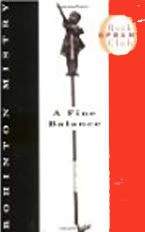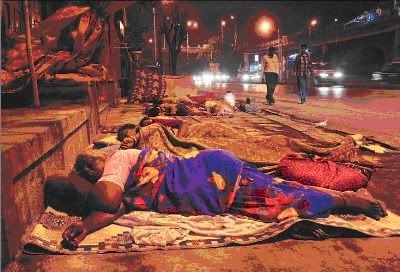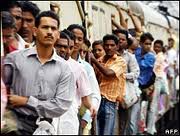Book Review: A Fine Balance by Rohinton Mistry

Rohinton Mistry’s third novel, A Fine Balance (1995), won the second annual Giller Prize in 1995, and in 1996, the Los Angeles Times Book Prize for Fiction. It also snagged the 1996 Commonwealth Writers Prize, the Royal Society of Literature’s Winifred Holtby Award, and Denmark’s ALOA Prize, and was shortlisted for the 1996 Booker prize. It was selected for Oprah’s Book Club in November 2001. All for good reason.
Set in 1975 India during “The Emergency” when the Prime Minister, Indira Gandhi, “ruled by decree”, A Fine Balance tells the stories of four people who, because of circumstances, end up living together in a small flat.
Dina Dalal, a fortyish widow who grew up in a wealthy family and who jealously guards her independence from her merchant brother, is the official tenant of the flat.
Maneck Kohlah grew up in a small mountain village near the Pakistan border. His father owned the local general store and sold his secret formula Kohlah’s Cola. When the highway comes through the village, his father’s business suffers because of the importation of mass-produced soft drinks.
At seventeen, wanting a career independent of his father, Maneck decides to attend college in the city and obtain a certificate as an air-conditioning technician. Maneck’s mother was a school-mate of Dina’s, and so arranges for Maneck to board with her at her flat.
Uncle and nephew, Ishvar and Omprakesh Darji, members of the Chamaar caste, considered untouchables, have come to the city to start a new life after a family tragedy of barbaric cruelty. Trained as tailors, they are hired by Dina to sew piecework from patterns provided by an export company. Initially, they only work at Dina’s flat and do not live there. After a series of misfortunes, they end up sleeping in Dina’s veranda, bathing in her washroom, and eating meals with Dina and Maneck.
The co-existence of these strangers from disparate backgrounds begins tenuously but with a little choice.
…in a city where millions were living in slums and on the pavements. And not just beggars–even people with jobs who had the money to pay the rent. Only, there was nothing to rent.

The backstories of these characters create a depth of understanding in the reader and as their story unfolds, we feel emotionally invested in their future.
Even though the characters are skilfully and deeply drawn, A Fine Balance is not simply a character study. There is a blockbuster of a plot filled with the small triumphs and large tragedies of human existence. Although it would seem that India’s political affairs would be the “big picture” of this novel, the effects of those affairs on the population are so dramatic that the fabric of people’s lives becomes the greater theme.
 Mistry has made India live. The heat, the dust, the hunger and the thirst, the crowding, poverty, disease, and corruption become real to the reader. Even so, we are appalled when Dina’s brother, a member of the urban merchant or commercial class, says:
Mistry has made India live. The heat, the dust, the hunger and the thirst, the crowding, poverty, disease, and corruption become real to the reader. Even so, we are appalled when Dina’s brother, a member of the urban merchant or commercial class, says:
My friend was saying last week…that at least two hundred million people are surplus to requirements, they should be eliminated…you know–got rid of. Counting them as unemployment statistics year after year gets us nowhere, just makes the numbers look bad. What kind of lives do they have anyway? They sit in the gutter and look like corpses. Death would be a mercy.
Ultimately, A Fine Balance is about man’s inhumanity to man and the indomitableness of the human spirit. There’s plenty of heartache here. The tragedy, sorrow, and loss could overwhelm some readers: this is not a book for those looking for a happy ending. As Maneck, ever the student of air-conditioning observes:
If there was a large enough refrigerator, he would be able to preserve the happy times…, keep them from ever spoiling…but it was an unrefrigerated world. And everything ended badly.
A Fine Balance is a sweeping and powerful novel that has been compared to works of Tolstoy or Dickens. It is a rich study of a difficult time in India’s history, featuring complex and flawed characters.
It will certainly remain on the list of the best books I’ve read this year – perhaps even in my lifetime. I cannot recommend it enough. Five out of five stars.
Link for my Canadian readers:
A Fine Balance
P.S. If you click through the affiliate links in the book titles, you may notice a different cover. I like to see the cover that’s on the copy I read – and it’s usually different than Amazon.com because they display the American release, and I read the Canadian. Again, the links are affiliate links so I will receive a small percentage of any purchase you make after clicking through from this blog.


[…] Benj-O (The Canary List)57. Lucybird (I am Number Four)58. Lucybird (A Wild Sheep Chase))59. Debbie Rodgers – Exurbanis.com (A Fine Balance)60. Marie (Our Singing Planet)61. Marie (The Sandalwood Tree)62. Laughing (I Remember Nothing)63. A […]